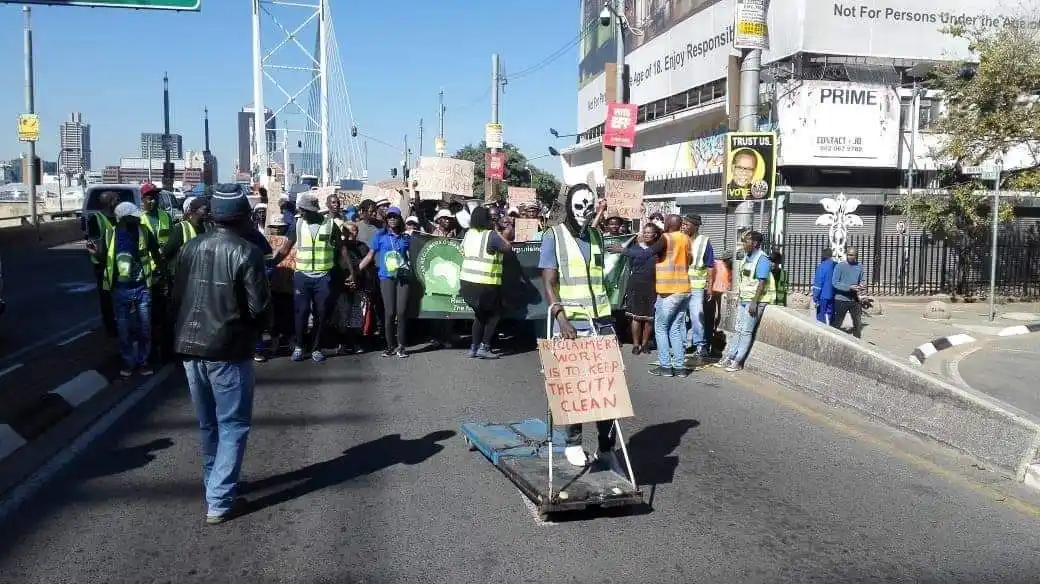From tree-lined suburbs to overflowing landfills, tens of thousands of people work in the shadow of South Africa’s stark inequality, salvaging cardboard, metals, glass and plastic from others’ waste. Informal reclaimers, also known as “waste pickers”, carry out as much as 90% of South Africa’s recycling and save municipalities up to R750 million each year in landfill costs. Yet for long hours spent collecting, sorting and transporting heavy loads, many often earn less than half the legal minimum wage.
Luyanda Hlatshwayo of the African Reclaimers Organisation (ARO) in Johannesburg spoke to fixlocal about how reclaimers have organised to claim recognition, rights and progress towards better pay. “We make decisions that affect us, not the government making decisions for us… we’re recognising ourselves as government.”
What is the problem?
Reclaiming comes with high physical costs and risks. Hlatshwayo explains that he and others can walk up to 40 km per day, carrying on average 200 kg of waste, in a harsh and often dangerous city where spaces to sort recyclables are scarce and they are prone to accidents and harassment. Exposure to toxic materials, glass shards and long hours in the sun add to the physical toll.
Despite providing a service that significantly supports South Africa’s waste management, reclaimers are not compensated adequately. A 2022 study found that three-quarters of reclaimers surveyed earned less than R600 a week. “The whole industry was comfortable with unpaid labour,” says Hlatshwayo.
How are they fixing it?
In 2017, African Reclaimers Organisation (ARO) was formed as a democratic body to defend the rights and livelihoods of informal recyclers. The efforts of its roughly 6,000 members have successfully fought for reclaimers to be appreciated as major players in Johannesburg’s and other cities’ waste management.
“The problem is that reclaimers are generally invisible.” Hlatswayo continues, “The biggest issue was recognition. Recognition from society, recognition from our families, recognition from the government, the public sector, from all levels of society.”
Through coming together to share experiences and knowledge, ARO has formed communities and built power that fosters respect for reclaiming. This created a “platform where we are treated as stakeholders without any stigma,” says Hlatshwayo.

What makes it work?
Protests, petitions and public comment
In 2017, the City of Johannesburg began bypassing the informal economy by issuing recycling tenders and proposing a R50 household recycling levy, threatening thousands of reclaimers' livelihoods. In 2021, ARO won a major victory when the City of Joburg agreed to drop the R50 proposed recycling levy and to consult with reclaimers as primary recyclers.
The organisation led a peaceful protest across Nelson Mandela Bridge, gathered over 3,600 petition signatures, gained media attention and used government feedback channels — especially Joburg’s Integrated Development Plan public comment process — making it impossible for the city to ignore them. “Immediately when we decided to make our own decisions and stop begging, that’s when we saw things happening,” Hlatswayo explains.
Creating alliances and partnerships
ARO’s battle for recognition and better conditions has grown by developing relationships with communities, artists, the media and across international networks like the International Alliance of Waste Pickers. ARO has strong ties with researchers at the University of Johannesburg across disciplines, from sociology to visual arts. Academic partnerships have enabled reclaimers to quantify their impact, reach wider audiences and pressure municipalities and businesses to recognise them as essential to local waste economies.
“Not only are we organising ourselves, we are organising communities, students, academics… we’re able to organise everyone in a common purpose that affects us,” says Hlatshwayo.
Protecting health and wellbeing
Hlatshwayo lost the ability to walk after an accident last year, but thanks to ARO’s support, physiotherapy has enabled him to walk again.
ARO has established a Reclaimer Wellness Fund for members who get injured and provides transport, protective gear like masks, gloves and boots to reclaimers. In partnership with academic institutions and the National Health Institute, they are creating clinics to treat health issues specific to reclaimers.
To holistically support reclaimers’ families, ARO has created early childhood development centres designed, built and funded by reclaimers. Teenage children benefit from a school holiday programme with UJ, where they are mentored for further education.
Secure sorting warehouses
It’s essential to the health of reclaimers to secure clean, safe spaces to store, sort and process recyclables. ARO has started a processing warehouse in Selby that formally employs 70 salaried reclaimers. “We would love to have a reclaimer warehouse in each and every ward… in each and every province,” says Hlatshwayo. Seeing the success of the warehouse, the Mogale City Municipality has given reclaimers land for a second sorting site.
Pushing for systemic change
In 2020, South Africa adopted the Extended Producer Responsibility (EPR) Act, which requires companies producing packaging to take responsibility for products throughout their lifecycle, including waste after consumer use. Importantly, the law requires producers to pay individual reclaimers based on weights collected for keeping waste out of the environment and returning it to the economy.
In the year since the law passed, ARO has registered reclaimers nationwide to track collections and enable payment. A handful of reclaimers now receive EPR payments from plastic producers, but the system is far from its full promise due to reluctance and resistance from companies and buy-back centres.
“It’s not being prioritised right now,” Hlatshwayo says. “If it was, we would get everyone on the system and start paying everyone at once… They are calculating millions and billions, but we are calculating livelihoods.”
Get involved
Hlatshwayo says the best way to support reclaimers is to combat stigma by respectfully engaging with the reclaimers in your neighbourhood. Ask your local reclaimers what can be done to make their lives easier - often this can be as straightforward as cleaning and separating your household waste. To keep up to date on ways to support ARO follow them on social media and check out their website.
Acknowledgements
Author: Maru Attwood
Photos: Supplied by ARO